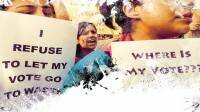Pakistan’s general elections 2013 are facing an unusual religious divide in the shape of a split of the right-wing vote bank after the emergence of Pakistan Tehrik-e-Insaf (PTI) as one of the mainstream political parties, with a leaning towards right-wing vote bank.
All major religio-political parties have fielded their candidates, independently, across Pakistan after failing in having a united platform like the Muttahida Majlis-e-Amal (MMA) in the general elections of 2002. Even the efforts on creating a grand alliance with the right-winger mainstream political parties, like Islami Jamhoori Ittehad (IJI) and Pakistan National Alliance (PNA) against Pakistan People’s party (PPP) in the past, could also not be materialised this time.
There are three major religio-political parties on the scene: Jamiat Ulema-e-Islam (Fazlur Rehman), commonly known as JUI-F, Jamaat-e-Islami (JI) and Muttahida Deeni Mahaz (MDM), a political alliance of six religious parties which were also part of Difa-e-Pakistan Council, a grand coalition of different religious groups active against what they like to call American invasion of Afghanistan, drone strikes and ‘War on Terror’.
The alliance — MDM — is led by Maulana Samiul Haq of Jamiat Ulema-e-Islam (Samiul Haq faction), while Jamiat Ulema-e-Islam-Noorani (JUI-N), Pakistan Rah-e-Haq Party, Jamiat Ahl-e-Hadees, Ahle Sunnat Wal Jamaat, formerly known as Sipah-e-Sahaba Pakistan, and Jamiat Ulema-e-Pakistan are other parties.
The MMA, comprising of Jamaat-i-Islami, JUI-F, JUI-S, Jamiat Ulema-i-Pakistan-Noorani, Jamaat Ahl-e-Hadith of Sajid Mir and Tehrik-i-Islami of Allama Sajid Naqvi, managed as many as 59 seats in general elections in 2002. In 2008, JI boycotted general elections and JUI-F fielded its candidates only in Khyber Paktunkhwa and Balochistan under the banner of MMA but faced a humiliating defeat as compared to elections in 2002.
In 2002, the MMA after securing around 12 percent of the total polled votes emerged as the party with fourth largest number of votes and the third major party in the National Assembly by seats won. It was the first party in Khyber Pakhunkhawa and Balochistan to win such huge number of votes, according to the ECP data.
In the 2008 general elections, MMA/JUI-F managed only seven seats in the National Assembly while it was third in the most number of votes that parties received in KP and Balochistan.
In 2002, percentage wise it had almost 47 percent and 22 percent votes in KP and Balochistan. In 2008, it was almost 14 percent and 13.5 percent in these provinces creating a major gap in its vote bank. The MMA had 48 seats in KP and three in Balochistan provincial assemblies in 2002, while it had only 10 in KP and seven in Balochistan in 2008. The JUI-F could grab only one-third of the actual MMA’s vote bank.
Ahead of general elections 2013, the religio-political parties are holding each other responsible for the failure to form an electoral alliance or devise a seat adjustment formula. They have also failed to manage a greater alliance with any other mainstream political party, such as with PML-N and PTI, as the religious factions demanded more number of seats than their original vote bank.
“We have fielded more than 83 candidates on national and provincial assemblies’ seats,” Maulana Muhammad Ahmad Ludhianvi of MDM said, adding, “This is the first time that ASWJ is contesting elections as a party on the platform of MDM rather than supporting local candidates or other mainstream parties.” He said that they aimed to continue their struggle to have passed anti-Shiite laws in the assemblies and make Pakistan a “Sunni” Islamic state. He said that they tried their best to bring JUI-F and JI on the MDM platform because they believed that only one platform could strengthen their cause to bring Islamic system and Shariah in the country.
The JUI-F has fielded 132 candidates running for 45 national and 87 provincial assembly seats in KP only. The JI is second with 127 candidates on 41 national and 86 provincial assembly seats in KP. The JI has also launched its candidates in urban Sindh (mainly Karachi) and Punjab.
“We tried our best to bring religious parties on one platform and form a great alliance like in the previous elections but we could not manage it,” said Liaqat Baloch, Central General Secretary of JI. He said there had been an understating within the party that they would not support, or make an alliance with, any party that was part of the last coalition government, a government that emerged as a result of the general elections of 2008, held under the supervision of dictator General Pervez Musharraf.
In KP, JUI-F faces a serious challenge from PTI this time, while in Punjab JI has a limited vote bank against PTI and PML-N. There are chances of further split of this religious vote. JUI-S and ASWJ (formerly SSP) also have a sizeable vote bank in certain constituencies in KP, Sindh and Punjab.
Having been in power in the past 10 years – first as part of the MMA and then as a coalition partner of PPP in the federal setup – JUI-F believes that it has strengthened its vote bank as compared to the vote bank of JI that it lost as JI did not participate in general elections of 2008. “We are very hopeful to emerge as the single largest party of KP this time,” a confident Maulana Fazlur Rehman said while talking to media many times.
JI also tried to have seat adjustment with PTI and PML-N but its efforts failed after it demanded more seats at national and provincial level across the country. The mainstream political parties disappointed JI because of internal pressures to have their own candidates on majority of seats.
Similarly, MDM also failed to have an alliance with the PML-N despite having the impression in the national and international media that the ASWJ and PML-N are on good terms. The real setback to ASWJ happened when the PML-N embraced the ASWJ chief’s main rival, Sheikh family, in district Jhang. “Our workers were disappointed as they were hoping a bigger cooperation with the PML-N this time,” Ludhianvi said.
JUI-F’s overconfidence after being in government for the past one decade, JI’s ambitiousness this time around after it boycotted the 2008 general elections, and ASWJ’s and Maulana Samiul Haq’s negative reputation internationally because of how they sympathise with what is happening with America in Afghanistan, and because of their support for the militant wings that favour Taliban, these are the factors that have also made these main religious parties going for solo-flight this time.
On the other side, Pakistan’s Sunni Brelvi groups, like Pakistan Sunni Tehrik and Sunni Ittehad Council, are also having solo flights in the general elections. The PST is politically limited to Karachi while SIC has also lost momentum after the death of its chairman Sahibzada Fazal Karim who died a few weeks ago.
Main Shiite organisation, the Shiite Ulema Council (formerly Tehrik-e-Nafaz-e-Fiaqh Jafaria) of Allama Sajid Naqvi, is also not part of any alliance and has fielded its candidates independently. Interestingly, on the other side, Majlis-e-Whadatul Muslimeen (MWM), another major Shiite organisation that surfaced a couple of years ago after blaming Sajid Naqvi group of failing to deliver and resist against Shiite killings in Pakistan, has also fielded its candidates independent across the country.
All Deoband, Brelvi, Wahabi, and Sunni vote is largely split because of internal rifts, inter- and intra-party disagreements, putting the religious parties in disarray. Whether these religious factions manage to get their due share in the general elections 2013 and come under one umbrella in the post-elections parliamentary alliance for achieving their greater goals and power-sharing or they fall prey to these divisions, losing even their previous strength, remains yet to be seen.
The writer is a journalist based in Lahore.
























